#etc etc like ted getting concrete evidence of all the good hes done of how he has actively made the lives of everyone around him better
Explore tagged Tumblr posts
Text
currently spinning an "it's a wonderful life" style 'ted, at his lowest and least confident, sees what would have happened if he never came to richmond' au in my brain that i'll never write
#or if he'd never been born at all but like im mostly just thinking about like#seeing the direct change in all the people he's grown to love#like. shit like rebecca getting more and more angry and cruel and ending up self destructing bc of it#jamie getting worse and more isolated and in pain#roy not working on ANY of his shit#and like. trent. god trent. retreating ever further into his shell#possibly still married to a woman and deeply deeply unhappy and isolating himself#etc etc like ted getting concrete evidence of all the good hes done of how he has actively made the lives of everyone around him better#and like ted losing confidence in himself--he was sent here to destroy the team and hes destroying so much--and then seeing this ??? ough#idk im just rotating it in my brain#like i dont have a concrete idea of what that woudl actually look like#hence why i probably wont write it but. ough#ted lasso tv#ted lasso
14 notes
·
View notes
Text
Ethics and Reproducibility: Moira’s start of darkness

Disclaimer: I’m a social psychologist,working at a U.S. university.The basic principles of what I’m talking about apply to Moira’s situation as well, but some of the details may differ.
As a researcher myself, Moira has possibly one of the most relatable evil origin stories I’ve seen in my life. It’s like Blizzard took a researcher,asked them what would make them go straight-up villainous, and turned that into a character.
Let me explain.
Three parts under the read more (with lots more pictures):
1. Ethics approval in research
2. Difficulty with reproducing research
3. The publication process
“Overwatch held back the pace of scientific discovery for decades. They believed that my methods were too radical. Too controversial. They tried to silence me.”
“We delved deeper into those areas forbidden by law. By morality.”
How exactly was Overwatch slowing down Moira’s research and stopping her? Lemme tell you about the IRB.
“IRB” is short for “Institutional Review Board.” It’s also known by a few other names, but let’s ignore that for now. Their job is pretty much to make sure we aren’t being evil scientists. Not traumatizing participants and all that. Researchers can’t so much as sneeze without their approval. If they find a study even slightly off, they’ll order revisions or, in extreme cases, shut it down completely. Their sole purpose is to stop Moiras. (Edit: See the end of the post for more details on why IRBs are very necessary, and how Moira’s character was likely inspired by the dark history of research past.)

In theory.
Here’s how your typical IRB review goes:
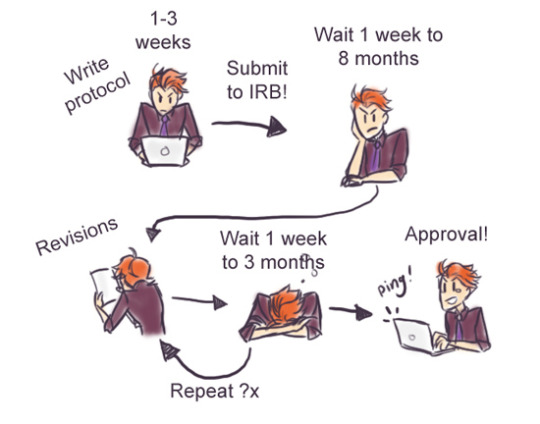
Sometimes (Edit: rarely) IRBs get drunk on their power. In those cases they might request revisions or reject research projects for reasons that have absolutely nothing to do with the participants’ safety:
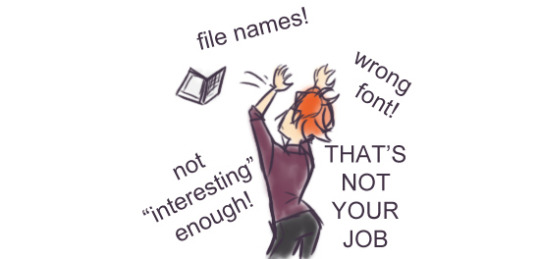
I’ve never met a researcher that didn’t have some kind of IRB horror story. We totally understand why they’re necessary (any researcher worth their salt can rattle off a list of studies that made IRBs necessary), but dang can they be fury-inducing. I’m sure that all of us have wished we could skip that hurdle from time to time, no matter how good and ethical it is to have them.
“In addition, other geneticists were unable to reproduce the results of Moira's research, which further called her discoveries into question. Instead of kickstarting her career, her paper seriously damaged her reputation.”
Let me tell you a story. The story of a researcher named Amy Cuddy. I’m going to be brief, but if you want a more in-depth description, you can read this NY Times article.
Lately all kinds of research disciplines, from Psychology to Biology, have been having trouble with reproducibility. I’ve seen speculation that Moira faked her results, or that she’s just better than other scientists and that’s why.
Amy Cuddy kinda became the so-called “poster-child” of this problem for social psychology. I’m not sure why she was singled out in particular (LOTS of researchers have research that’s failed to replicate), but it’s probably because she has one of the most popular TED talks of all time on exactly the research that’s having trouble replicating. Only half of her findings aren’t replicating (the other half are), but that’s not stopping people.
It’s possible she inspired that part of Moira’s backstory.

People started attacking her, calling her a fraud, dragging her name through the mud, basically using her name as a pejorative. Because her research failed to replicate, and she didn’t immediately disown it (she’s not the only one to have this reaction, but she’s the one who got hit hardest for it). She was pressured out of her job at Harvard, lost friends, lost her health, her reputation, etc. Researchers criticizing work using “for the sake of research” as an excuse can be brutal.
And the thing is, it wasn’t her fault. And it’s not that other researchers are stupid either.

Why doesn’t research replicate?
Well, there are a bunch of reasons. Sure, fraud can be one of them. But cases of fraud are exceedingly rare. The only one I can think of is Diederik Stapel. And yeah. Sometimes research doesn’t replicate because people trying to replicate it make some kind of mistake. But in that case it wouldn’t cause the reputational damage we see in Moira’s case.
It all comes down to how science works in the first place.
Possible reason 1: Statistics.
There’s always a chance that scientific “findings” could’ve happened due to a coincidence. Maybe Gabe would’ve turned into a smoke monster anyway, and the experiments Moira did just happened around the same time by coincidence.
So we have statistics.
(Canon note: Moira was disgraced before she joined Blackwatch, but we’re not sure what her research was before then. I’m using this as a concrete example in lieu of whatever her earlier work was.)
I’m not gonna go into the details, but statistics tell us if our results probably weren’t a coincidence. But they can’t guarantee it. We generally say that, if our math tells us there was a 95% chance our results weren’t a coincidence, then our results are “real.” But there’s always that 5% chance that they’re still just random chance. It could be that Moira’s big paper was part of that 5%.
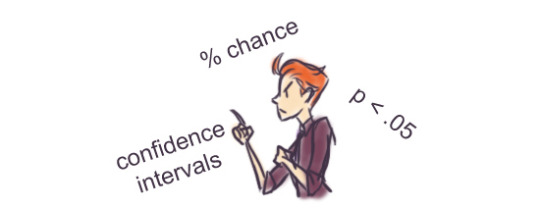
There are also ways of fiddling with statistics that increase that 5% chance, and sometimes researchers make mistakes. (Or, on rare occasions, do it intentionally to get published. Without publications, you don’t get funding or jobs. No more money, no more research, no more job. So sometimes people “cheat.” The practice of fiddling with your data is called p-hacking, and this toxic bit of academic culture is called “publish or perish.” But I don’t think either of those are relevant to Moira, seeing as she does get “real” results.)
Statistics also make a lot of assumptions about how data “should” look, but data rarely meets those assumptions in the real world. Not meeting them can increase your chance of finding (or not finding) evidence for something, regardless of the objective truth.
Possible reason 2: Third variables.
In science, it’s rarely possible to account for absolutely everything. Sometimes results can’t be replicated because there’s some other thing influencing the results.
Maybe Moira’s Shadow Monster Formula only works on, say, people who’ve also been in the SEP. Or maybe it only works when the room’s a specific temperature. Or maybe it’s the time of day, or the subject’s metabolism, or their mood, or something accidentally fell into Moira’s mix and she didn’t notice, and that’s what made it work. Any researcher trying to reproduce her results without knowing about that unknown third variable wouldn’t succeed, and they might assume she made it all up.
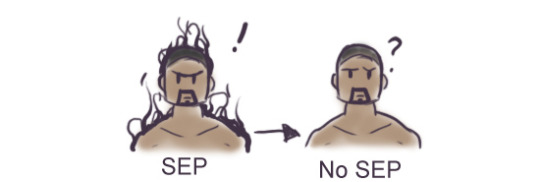
Publishing Papers
Now, a quick timeline of publishing a paper: (This is based on my experience in social psychology. It may differ for biology. Grant writing isn’t always necessary if you have other funding, or the study doesn’t require money for materials or paying participants. This is, as you can imagine, rarely the case for biology.)
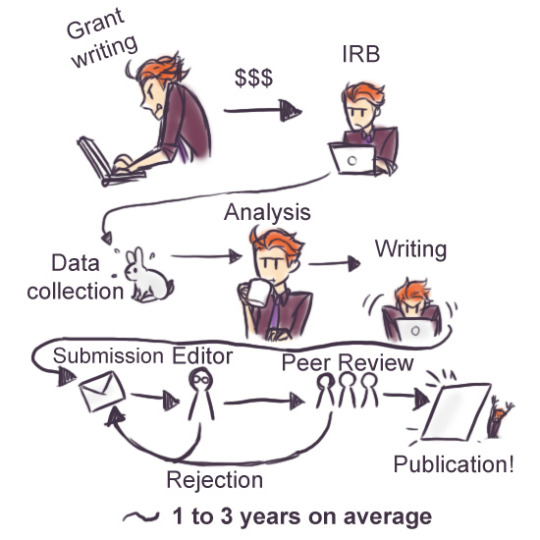
After all that work and all that time (for a single paper!), your research doesn’t replicate due to what amounts to basically bad luck... And then after all that hard work, and all of that time, you get turned into a social pariah and accused of being a fraud, just because of some random chance.
Do I condone Moira’s actions? Hell no.
But do I understand why she snapped? Well... yes.
EDIT: @tacticalgrandma made a great point. I absolutely shouldn’t talk about this without talking about some other very important things that the writers were getting at.
On a meta level, the writers almost definitely wrote her to reflect some of the more unsavory parts of research history. She represents and references unethical researchers throughout history.
Research has a long history of doing some really awful things, often disproportionately targeting minorities and other at-risk populations like prisoners.
Some examples of this are infecting African Americans with syphilis, and not treating them even after a treatment became available. The Milgram experiment, which essentially convinced many of its participants that they’d killed someone. And the Little Albert study.
In the Little Albert study, researchers conditioned a child to be TERRIFIED of anything white and fluffy (INCLUDING SANTA) and then just never did anything to fix it. The fear of white-and-fluffy later generalized to anything-fluffy. They lost track of him, and let him live his life terrified of everything white and fluffy. I think that Moira’s association with a white rabbit may be a direct reference to this particular study.
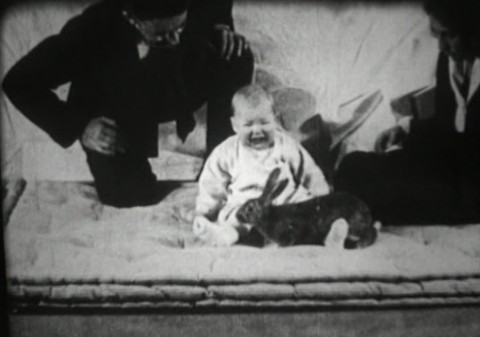
Researchers have done some HORRIBLE things in the past, resulting in great loss of life, loss of quality of life, and long-lasting trauma for many people, that disproportionately affected minorities and vulnerable populations.
Moira intentionally evokes this past, and operates much like one of the researchers from the pre-IRB era: people who all-too-often only saw “scientific progress,” and failed to see the real people that they were hurting. It’s possible that her experimentation on Gabe is also a reference to this history of unethical research practices with minorities. Gabe is an ethnic minority, and Moira experimented on him. She took those results and retained all the good parts of them for herself (sucking away life force, and teleportation) without the disadvantages that Gabe endures (constant pain). Even if Gabe initially consented to the experiments, Michael Chu’s stated that he was scared of the results, and his voice lines definitely imply that he is NOT happy with the results.
Moira’s rejection of ethics is a rejection of the rights and humanity of her participants. Her mindset is a reflection of some HUGE problems and HORRIFIC things in research.
Putting knowledge above the happiness, safety, and autonomy of people is NEVER okay, no matter what you’ve been through. What Moira may or may not have experiences in NO WAY justifies her actions. She’s a villain through-and-through.
192 notes
·
View notes